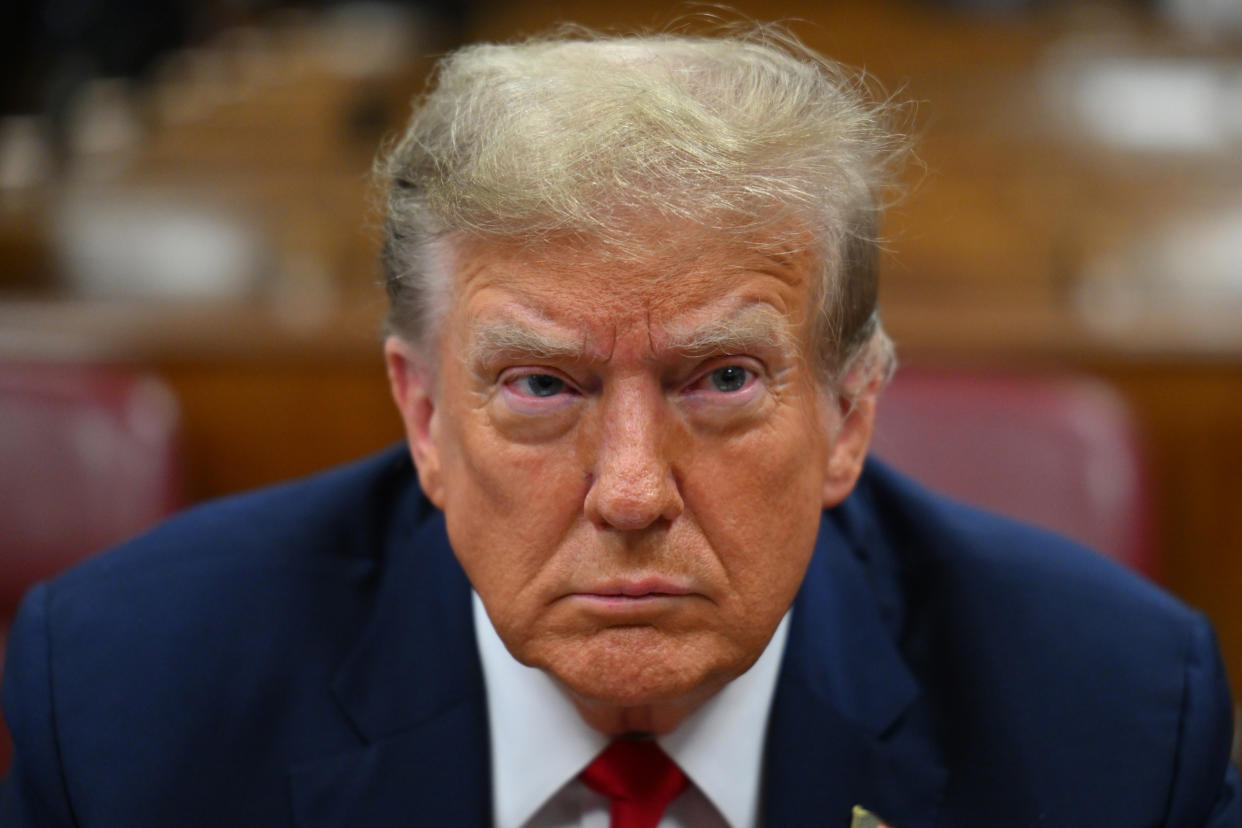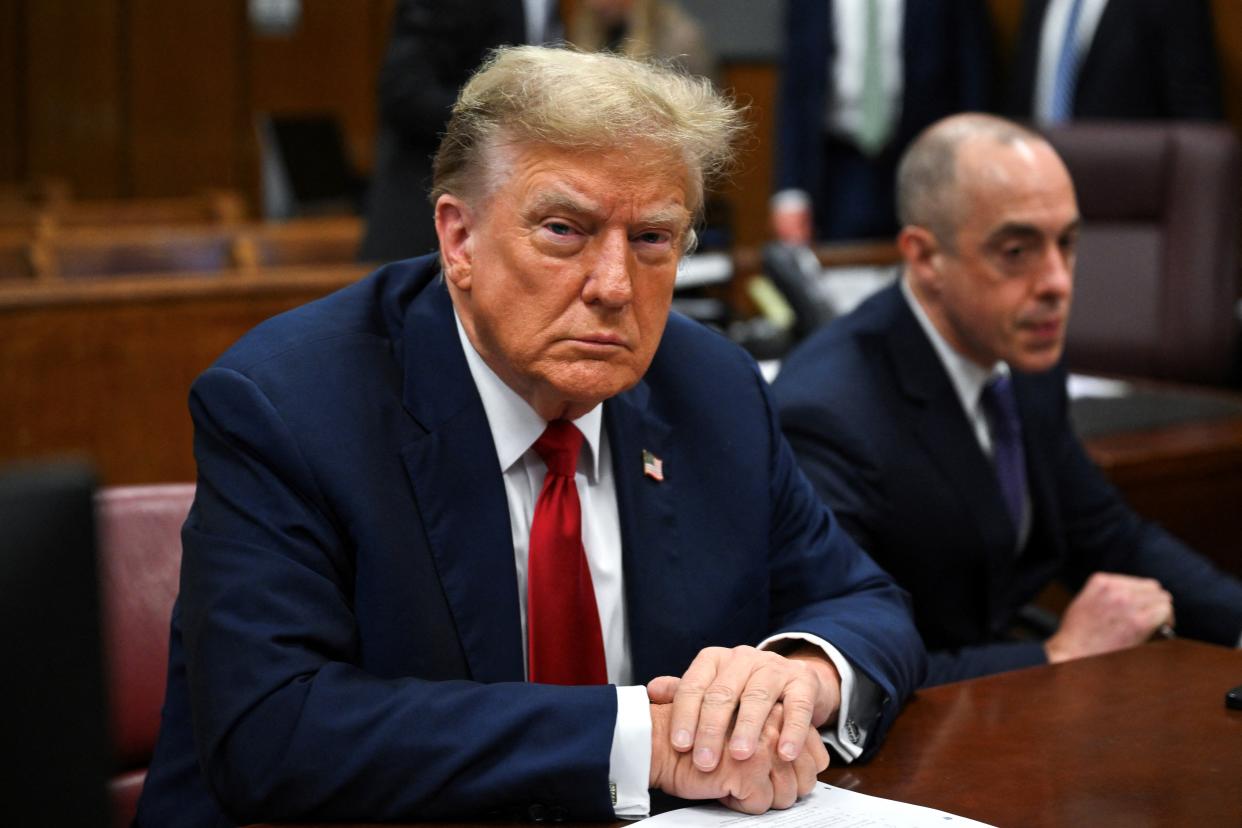Trump's hush money trial began Monday. We answer your questions about the case.
Yahoo News asked readers to submit their questions about former President Donald Trump’s New York trial on charges that he falsified business records to hide a $130,000 payment to porn star Stormy Daniels from voters during the 2016 election.
We received hundreds of excellent questions. Here’s a sampling (readers were asked how they wanted to be identified), along with some answers:
Greg asked: Will the trial take place Monday or will Trump get away with more stall tactics?
In the week preceding the trial alone, three different appeals court judges rejected motions from Trump’s lawyers to delay the start of the trial. Trump was able to push back the initial March 25 start date after his lawyers argued that they needed more time to review evidence introduced by federal prosecutors, but his lawyers have been unsuccessful in at least 12 other attempts to stall the start of the trial, including Friday, when Merchan refused Trump’s lawyers’ request delay the proceedings because the case has generated too much publicity.
Anonymous asked: New York state prohibits cameras in the courtroom, so how will the press cover the trial?
Reporters from several news outlets will be in the courtroom throughout the trial, and others will be reporting from a holding area in the building. They will be allowed to share their impressions with the public in real time. At the start of each day, photographers will be allowed to snap pictures before the start of the proceedings but will then be ushered out of the room.

Anne asked: I am very concerned about the integrity of the jury and that jury screening won't be stringent enough to keep out his ardent supporters who will no doubt vote to acquit regardless of the evidence and testimony. How can an impartial jury be ensured?
This goes both ways. Last week, Trump was unsuccessful in convincing an appeals court to delay the trial while he tries to change the venue from Manhattan, a Democratic stronghold, to Staten Island. Finding an impartial jury for a celebrity or a well-known politician can be a difficult problem because opinions on that defendant can already be set. Judge Juan Merchan has stated that he won't let lawyers for the prosecution or defense ask potential jurors about their voting choices, political contributions or party registration. In picking the 12 jurors and six alternates to serve during the trial, prosecutors and defense lawyers can reject only a limited number, meaning they will have to try to assemble a jury that they believe gives them the best chance of winning the case. Merchan also ruled last month that while Trump and his lawyers can learn the identity of the jurors, they may not release that information publicly.
Steve Johnson asked: Is the prosecutor able to articulate the evidence to support a clear conclusion and potential conviction?
Merchan reviewed the charges being brought by Manhattan District Attorney Alvin Bragg and found that they can be brought before a jury. Numerous challenges have been filed by Trump’s lawyers in New York appeals courts and the bulk of them have been denied. Ultimately, it’s up to that jury to decide whether Bragg’s case, or the defense presented by Trump’s lawyers, is strong enough to “support a clear conclusion” either way.
Scott asked: Is Bragg essentially trying to prosecute what should be a federal charge, under federal election law?
Skeptics question whether Bragg can pursue federal election law violations in this state-level case. That may be the toughest thing he will have to justify to a jury. But Trump is also accused of violating New York state laws involving the falsification of business records that have been elevated from misdemeanor to felony counts because they were committed in furtherance of other crimes.

Mark asked: Weren't the facts of this case reviewed by federal prosecutors in the Biden administration who determined that there was no crime to prosecute prior to Bragg deciding to prosecute?
When they investigated Trump’s payment to Daniels when Trump was president, Justice Department prosecutors and special counsel Robert Mueller decided not to bring charges against him. They cited a Department of Justice directive from the Nixon era that prevented sitting presidents from being indicted, the New York Times reported. Once Trump was out of office, federal prosecutors with the Southern District of New York continued to hold off bringing charges against Trump, though their reasoning remains unclear.
Mary asked: Now that hush money is considered illegal, will this court prosecute senators and congressmen who paid to cover up their sexual harassment complaints?
In and of themselves, hush money payments are not illegal. In fact, they can be similar to nondisclosure agreements. But Bragg is alleging that Trump sought to hide the payment to keep voters from knowing about it, thereby violating campaign finance laws, and as a way to avoid paying taxes on the amount. You raise a great point, however, about whether hush money payments to politicians should all be considered crimes if they are meant to keep voters in the dark.
Thomas asked: If he is convicted, can Trump pardon himself if elected president again?
A president can issue pardons only for federal offenses, not for state charges.
Todd asked: If Trump is convicted and given jail time, will he have Secret Service detail to protect him while he serves the sentence?
The U.S. Secret Service protects former presidents, so if Trump is sentenced to jail time, that would set up a historic legal test that would likely have to be decided in, you guessed it, another court case.
John Bell asked: Would you even be covering this if it wasn't 45?
While the question seems to imply that the media is biased against the 45th U.S. president, the fact that he is the first former commander in chief to be indicted on criminal charges and to have that case tried in court is, whether one believes that the charges have merit, a newsworthy event.


